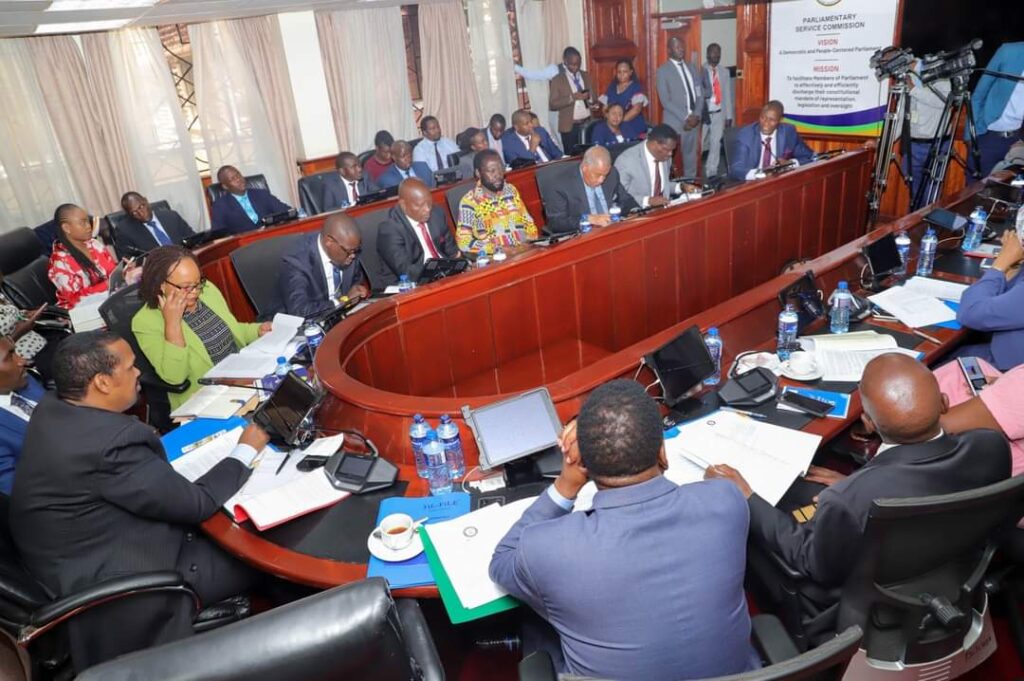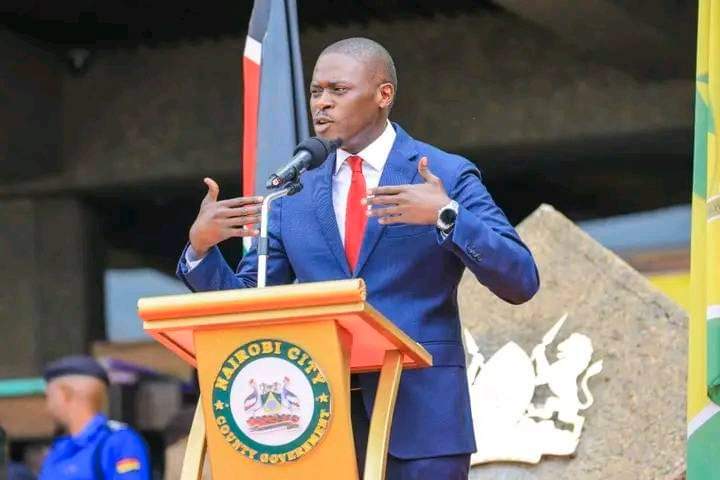Nairobi Governor Johnson Sakaja has warned residents who record county officers, known as “kanjos,” during routine enforcement that they will face arrest. Sakaja, who spoke during a meeting with the officers, expressed frustration with the growing trend of certain traders and citizens engaging in theatrics during county inspectorate inspections.

NAIROBI CITY COUNCIL

He claimed that the behavior interferes with the officers’ ability to effectively enforce regulations and maintain order in the city.Asserting the need for continuous enforcement of justice, Sakaja stated, “Anyone found recording your actions should be detained; it constitutes obstruction of justice. It’s imperative that you carry out your duties without hindrance!”
He also expressed concern about what he called the misuse of recorded footage by some city residents to sensationalise incidents and gain attention on social media platforms.At the same time, Governor Sakaja highlighted the gravity of defying city laws and resisting arrest, emphasizing the officers’ obligation to uphold law and order. He reiterated his unwavering support for the officers and urged them to uphold the law zealously, without fear or favour.
In Nairobi, Kenya, the issue of citizen recording rights and municipal authority has sparked controversy, particularly concerning the actions of Governor Sakaja. Recently, Governor Sakaja granted permission for municipal officers, known as ‘Kanjos,’ to arrest citizens who record or photograph them during raids.
This decision has ignited a debate about the boundaries of freedom of expression, transparency in governance, and the role of local authorities in maintaining order. To understand this complex issue, it is essential to examine the historical context, legal framework, practical implications, and societal perspectives.
Kenya has a rich history of activism and struggle for democratic rights. Since gaining independence in 1963, the country has made significant strides in promoting freedom of expression and media pluralism.
However, challenges persist, particularly in the realm of government accountability and transparency. In recent years, citizen journalism, enabled by the widespread use of smartphones and social media, has become a potent tool for holding authorities accountable and exposing corruption.
Kenya’s legal framework guarantees freedom of expression and the press under Article 33 of the Constitution. Additionally, the Access to Information Act of 2016 ensures transparency and accountability by granting citizens the right to access government information.
However, the same legal system also empowers municipal authorities to maintain law and order through measures such as the Nairobi City County Enforcement Act, which governs the activities of ‘Kanjos’ in Nairobi.
Governor Sakaja’s decision to allow ‘Kanjos’ to arrest citizens recording or photographing them during raids raises fundamental questions about the balance between individual rights and municipal authority.
On one hand, proponents argue that such measures are necessary to prevent obstruction of justice and ensure the safety of municipal officers. They contend that unauthorized recording or photography can compromise ongoing operations and expose officers to undue risk.
On the other hand, critics view this decision as an infringement on freedom of expression and media freedom. They argue that citizen recording serves as a check on the abuse of power and fosters transparency in governance. By criminalizing such actions, they claim that the government is attempting to suppress dissent and shield itself from public scrutiny.
The practical implications of Governor Sakaja’s decision are multifaceted. From a law enforcement perspective, it may deter citizens from interfering with legitimate municipal operations and help maintain order in the city. However, it could also erode trust between the government and the governed, as citizens perceive attempts to silence their voices and conceal potential misconduct.
Furthermore, the enforcement of such a policy poses logistical challenges, as distinguishing between legitimate journalism and unlawful interference can be subjective. This ambiguity may lead to arbitrary arrests and exacerbate tensions between citizens and authorities.
Public opinion on Governor Sakaja’s decision is divided. Some citizens support the measure, believing it will enhance the effectiveness of municipal enforcement and curb criminal activity in Nairobi. Others express concern about the erosion of civil liberties and the potential for abuse of power by municipal officers.
Additionally, civil society organizations and media outlets have condemned the decision, arguing that it undermines the principles of democracy and accountability. They have called for greater transparency in governance and respect for citizens’ right to document the actions of public officials.
The controversy surrounding Governor Sakaja’s decision highlights the delicate balance between freedom of expression and municipal authority in Nairobi. While the government has a legitimate interest in maintaining law and order, it must do so within the bounds of constitutional rights and democratic principles.
Moving forward, dialogue between stakeholders, including government officials, civil society groups, and citizens, is essential to address concerns and find common ground on this contentious issue. Ultimately, the goal should be to foster a society where transparency, accountability, and individual freedoms are upheld and respected.
In Nairobi, Kenya, the recent decision by Governor Sakaja to authorize ‘Kanjos’ to arrest citizens recording or photographing them during raids has ignited a fervent debate. This contentious issue raises fundamental questions about the delicate balance between individual freedoms and municipal authority. To delve deeper into this complex topic, it is imperative to explore the historical context, legal ramifications, practical implications, and societal perspectives.
Kenya’s journey towards democracy and freedom of expression has been marked by both progress and challenges. The nation has seen significant advancements in promoting civil liberties since gaining independence. However, instances of government overreach and suppression of dissent persist. In recent years, the advent of citizen journalism has empowered individuals to hold authorities accountable and shine a light on injustice.
The legal framework in Kenya provides robust protections for freedom of expression and media freedom under the constitution. However, it also grants municipalities the authority to enact laws to maintain order and enforce regulations. Governor Sakaja’s decision to empower ‘Kanjos’ must be examined within this legal context, ensuring that it does not infringe upon constitutionally guaranteed rights.
The practical implications of Governor Sakaja’s decision extend beyond law enforcement to encompass broader societal consequences. While it may enhance the effectiveness of municipal operations in the short term, it risks undermining public trust and exacerbating tensions between citizens and authorities. Moreover, the subjective nature of distinguishing between legitimate journalism and unlawful interference poses challenges in enforcement and may lead to arbitrary arrests.
Public opinion on Governor Sakaja’s decision reflects a diversity of viewpoints. Some citizens welcome the measure, viewing it as a necessary step to maintain law and order in Nairobi’s bustling streets. Others express apprehension, fearing that it could pave the way for government overreach and erosion of civil liberties. Civil society organizations and media outlets have been vocal in their opposition, emphasizing the importance of transparency and accountability in governance.
The controversy surrounding Governor Sakaja’s decision underscores the nuanced interplay between individual rights and governmental authority in Nairobi. While the government has a legitimate interest in maintaining order and safety, it must do so while upholding constitutional principles and respecting the rights of its citizens.
Moving forward, constructive dialogue and engagement among stakeholders will be essential in addressing concerns and finding common ground. Ultimately, the goal should be to foster a society where transparency, accountability, and individual freedoms are upheld as pillars of democracy.
